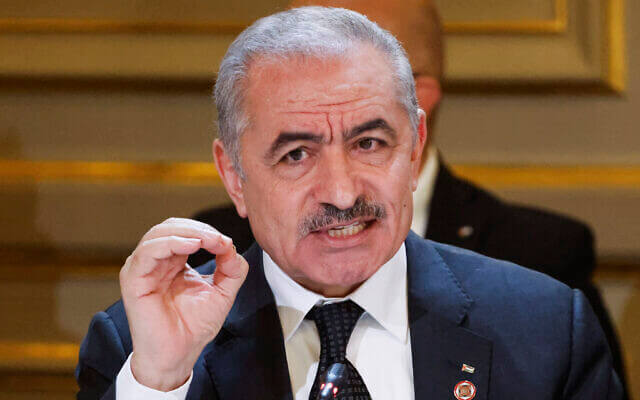The Prime Minister of the Palestinian Authority (PA) Mohammad Shtayyeh presented the unified resignation of his entire government Monday amid ongoing discussions of a unity-ruling government with Hamas.
According to the PA's official Wafa news agency, Shtayyeh informed members of the PA Cabinet during a recent gathering in Ramallah that this choice was in response to the "political, security and economic developments related to the aggression against Palestinian people in the Gaza Strip, and the unprecedented escalation in the West Bank, including the city of Jerusalem."
Shtayyeh further explained the PA would "remain in confrontation with the occupation [Israel]" and would also "continue to struggle to establish the state on the lands of Palestine."
"I see that the next stage and its challenges require new governmental and political arrangements that take into account the emerging reality in the Gaza Strip, the national unity talks [with Hamas], and the urgent need for an inter-Palestinian consensus based on a national basis, broad participation, unity of ranks, and the extension of the Palestinian Authority's sovereignty over the entire land of Palestine," the former PA prime minister said to members of the Cabinet.
The latest comments from Shtayyeh come as Sky News Arabia reported on Sunday that senior PA officials would resign from their positions "within days" to facilitate the formation of a Palestinian "technocrat government" with Hamas members. The primary goal of such a government would be the reconstruction of Gaza.
"Let us start by noting that Mohammad Shtayyeh is no more a "prime minister" than I am, for the Palestinian Authority is just that - an authority, not a government," said Daniel Pipes, president of Middle East Forum (MEF). "Second, as in any dictatorship, the #2 is but a flunky who carries out the orders of Mr. Big, in this case Mahmoud Abbas. Third, this silly exercise will not convince the Government of Israel to allow the PA to become the new powerbroker in Gaza, so it amounts to public relations," Pipes added.
According to Pipes, Israel has "already begun implementing plans to work with non-Hamas Gazans to administer Gaza, so this maneuvering has no significance."
Speaking to Fox and Friends on Monday, Israeli Prime Minister Benjamin (Bibi) Netanyahu referred to the recent shakeup in the PA as a game of "musical chairs." Netanyahu said that Israel wanted to see a "genuine de-radicalization" with regard to the PA and the Palestinian population."
"They have to stop teaching their children to become terrorists," he said.
"No one should have any faith in President Abbas’s pledges to reform, especially if he is going to include the murderous terrorists of Hamas," said Elliott Abrams, senior fellow for Middle Eastern studies at the Council on Foreign Relations (CFR) in Washington, DC.
"What Abbas calls 'technocrats' are usually old cronies soaked in corruption. Let's see the names before calling this 'reform,'" Abrams told The Foreign Desk.
Fatah, the military arm of the PA in the West Bank, and Hamas have made multiple unsuccessful attempts to agree to a unity government. Both terrorist organizations will convene in Moscow Wednesday for further discussions.
Sami Abu Zuhri, a senior spokesperson for Hamas, said that the resignation of Shtayyeh's government "only makes sense if it comes within the context of national consensus on arrangements for the next phase."
In early February, PA President Mahmoud Abbas (Abu Mazen) traveled to Doha at the invitation of Qatari Emir Sheikh Tamim bin Hamad Al Thani to discuss methods of integrating Hamas into a PA-led governing body encompassing Judea, Samaria, and Gaza.
After Abbas’s visit, Hamas allegedly endorsed a three-step proposal aiming for full reconciliation with the PA and for the terrorist organization to become part of the Palestine Liberation Organization (PLO), which oversees the PA.
Speaking to reporters in a Monday press briefing, United States State Department spokesperson Matthew Miller echoed statements made by PA President Abbas to Secretary of State Antony Blinken about taking steps towards "reforming the Palestinian Authority."
"We certainly welcome a revitalized-reformed Palestinian Authority," Miller added. Miller did not comment on whether or not it was appropriate for Shtayyeh to resign.
"Shtayyeh calls for a 'government of technocrats,' including Hamas members. Israel rejects Hamas operatives in a future government, explained Shoshana Bryen, senior director of The Jewish Policy Center and editor of inFOCUS Quarterly.
Bryen noted that in 2007, there was a brief and brutal war between Hamas and the PA in Gaza, with Hamas emerging as the victory and the underlying issues remaining unresolved. "It is unrealistic to assume the PA can take power in Gaza without opposition. Second, the PA might not be the desired place to find 'technocrats,'" Bryen told The Foreign Desk.
Bryen also noted that over the years, the PA government has " become riddled with irredentists," given that it has a law that provides "jobs to Palestinians who have served time in Israeli jails. The more egregious the crime, the longer the sentence, and the higher the position in the PA when they get out," she added. "With Shtayyeh or without, this is more like rearranging the deckchairs on the Titanic than a change in the form, function, and politics of the PA," Bryen told The Foreign Desk.
Related Story: Hamas, Palestinian Leadership Scramble to Figure Out who Should Govern Gaza Once War Ends









